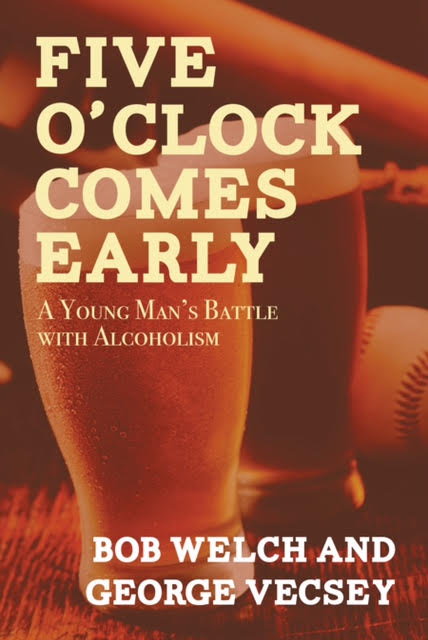|
There is no consolation for losing a friend way too young, but at least Bob Welch’s book on his alcoholism has a new life – in electronic form.
Bob died suddenly in June of 2014 at the age of 57. I wrote a tribute to him, how he went through rehab in 1980, at the age of 23, after nearly wrecking his pitching career. He stayed sober and wound up winning the Cy Young Award, but his real victory was sobriety. He set an example for others, particularly young people who think they are immune to being alcoholics at such an early age. Bob gives examples -- frightening, graphic, and illuminating -- of the acts and cover-ups of the alcoholic. His son Riley was the driving force behind the re-publication of Bob’s book. He wanted his dad to be remembered, for all the right reasons. I have written a new prologue and epilogue to cover the main points of Bob’s life after pitching. (There are also some links to stories about Bob, as well as a couple about alcoholism.) Bob always reminded people – and himself – that alcoholics need to be vigilant, day by day. I’m not an alcoholic, but I surely learned from Bob and my other friends that you don’t have to drink, at this moment. Of all the books I have written, this one has done the most good. Alas, the earlier versions of Bob’s book are out of print, but I hope anybody interested in “the problem” – particularly in the young -- will consider clicking off an e-copy of Bob’s book, via Open Road Integrated Media: http://www.amazon.com/Five-OClock-Comes-Early-Alcoholism-ebook/dp/B016XE7P18 Thank you, George Vecsey 11/12/2015 01:03:41 pm
George--another book tip. Keep them coming.
George Vecsey
11/12/2015 03:02:51 pm
Alan, thanks. When the book came out, I got some letters from people saying they were sober because of Bob's story. Somebody in my business said he learned a lot about his family history. It's very rewarding. Plus, I went through the family-week program Bob had gone through, and it definitely affected me. Hard to top that in some other book...but will keep typing. GV
mike from whitestone
11/13/2015 10:21:10 pm
GV, thanks for putting this book back on my radar. A nice reminder and easy identification for me, through sports and the humbling but gratifying message of the gift of sobriety.
George Vecsey
11/14/2015 08:09:44 am
Mike: thanks for the reminder. Be well, GV
Greg Schmidt
1/12/2016 10:03:11 am
George, Thank you for this book. I first got a copy in 1983 and Bob was kind enough to sign it for me in the parking lot of Dodger Stadium when I was just a kid in college. He encouraged me in my baseball career and your book helped me tremendously to avoid that road and understand people who suffer with the disease of alcoholism and many of the challenges. Having two roomates who I believe suffered from alcoholism when I pitched professionally, the book helped me try to help one of my teammates. the alcohol flowed freely and heavily in most of those clubhouses of teams I played for. Now as a pastor, I have welcomed many who are batteling this disease and introducing them to AA and celebrate recovery programs.
Michael Green
3/16/2016 09:53:01 pm
I'm a lifelong Dodger fan (WHY Vin didn't ask for me to succeed him, I'll never know), and Bob Welch came to the team when I was 13. I've always remembered one of his early starts, when Pete Rose was riding him and Rick Monday shouted something at Rose across the field, and Rose had to be restrained. I read the book you two wrote when it came out. I wasn't old enough to drink, but it was a lesson, and I remembered it. Comments are closed.
|
Categories
All
|










